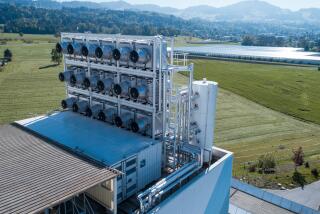Clinton Seeks to Boost Export of U.S. ‘Envirotech’ : Trade: Government would work with industry to expand the global market for environmental technology.
- Share via
WASHINGTON — The Clinton Administration unveiled a new strategy Monday to boost exports of U.S. environmental technology by encouraging greater coordination between industry and government and by focusing on promising new markets in Latin America and Asia.
The world market for “envirotech” products and services such as advanced waste disposal, smog mitigation and water purification is expected to more than double to $600 billion by the year 2000, Commerce Secretary Ronald H. Brown said.
U.S. companies already have a commanding share of this rapidly expanding market, which will help “drive the U.S. economy into the next century” and create thousands of jobs for skilled workers in as many as 60,000 small to medium-sized firms, he said.
But if American technology is to prevail over intense competition from Japan and Germany, Washington must “strengthen advocacy . . . streamline information and improve customer service,” Brown added.
The Administration’s strategy calls for placing environmental technology experts in key overseas markets to promote purchases of U.S. goods and services, create information clearinghouses for export-minded firms and increase access to financing for such ventures.
The government also wants to launch a Latin American environmental initiative to ensure that U.S. companies garner a substantial part of an estimated $6-billion annual market for environmental technology in Central and South America.
With the North American Free Trade Agreement scheduled to take effect Jan. 1, the newly formed Trade Promotion Coordinating Committee would focus special attention on developing markets for U.S. environmental technology companies in Mexico.
Trade officials said they believe the Administration’s efforts will have the biggest impact in California, Texas and New York, where the industry is already firmly established, generating annual revenues of more than $5 billion in each state.
The plan is the first specific initiative announced under President Clinton’s broader National Export Strategy, which seeks to boost U.S. exports of goods and services from $628 billion in 1992 to $1 trillion by the end of the decade. Achieving that goal would create 6 million new jobs, the Administration contends.
Brown said the initiative represents a sea change in how the government views its role in promoting environmental technology.
For decades, “we said to American businessmen and women, ‘Good luck, we wish you well out there in this global economic marketplace and we’re going to be watching you,’ ” he said. “This Administration says, ‘We’re going to be helping, we’re going to be working as a good and strong and effective partner.’ ”
Administration officials acknowledged that the initiative would be limited by budget constraints and that many of the proposed changes would simply redirect the efforts of U.S. Embassy personnel and environmental technology experts.
Under the initiative, more effort would be put into educating small and medium-sized environmental companies to enhance their access to export financing. Many such companies have no export experience, and their balance sheets are not strong enough to qualify them for financing through programs offered by the Export-Import Bank and the Overseas Private Investment Corp.
The Administration would try to increase awareness among environmental firms of government export-financing support programs and of projects that receive development assistance from U.S. or international agencies.
Carol Browner, administrator of the Environmental Protection Agency, said that as part of the initiative, the EPA intends to issue more broadly drafted directives, rather than prescribing precise standards that regulated industries must satisfy.
The new approach would give the environmental industry more flexibility, she said. As a result, environmental goods and service providers could develop innovative technologies specifically tailored and marketed to other countries with environmental problems.
More to Read
Inside the business of entertainment
The Wide Shot brings you news, analysis and insights on everything from streaming wars to production — and what it all means for the future.
You may occasionally receive promotional content from the Los Angeles Times.











